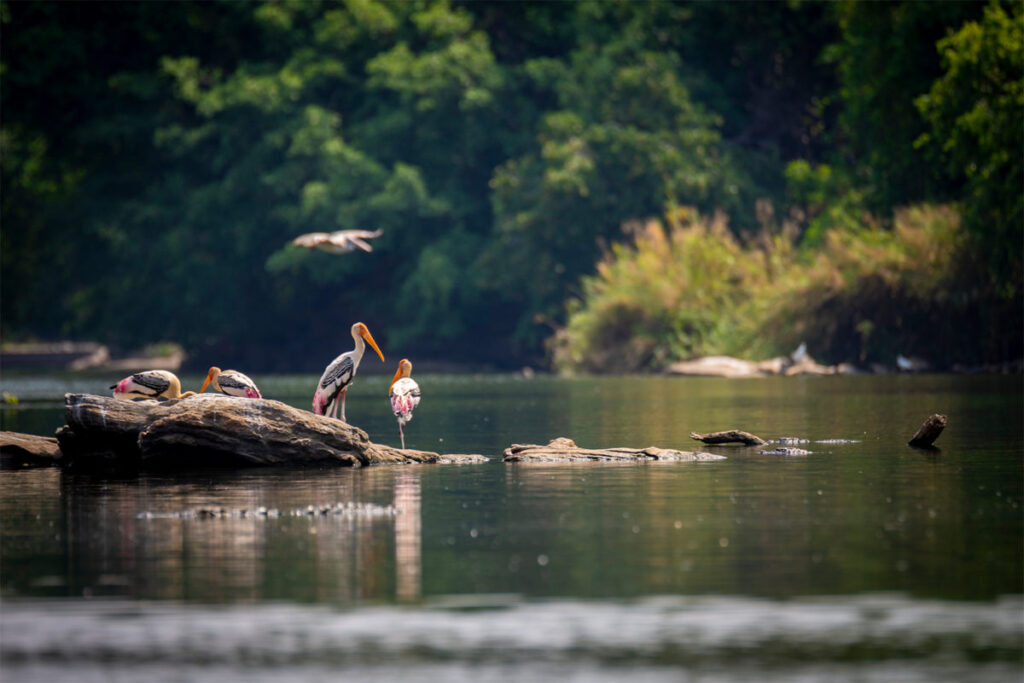Most Asian Nations Behind Biodiversity Targets For Protected Areas: Study
Dec 6, 2022 | Pratirodh Bureau
Painted storks in a river in Karnataka. Free-flowing rivers support extraordinary aquatic and terrestrial biodiversity (Photo by Subharnab Majumdar/Flickr)
(Source: PTI)
Most countries in Asia have failed to achieve a global minimum target of protecting at least 17 per cent of land by 2020, according to a study based on data from 40 countries.
Under current trends, the outlook for achieving the UN Global Biodiversity Framework’s 2030 target to protect at least 30 per cent of land is bleak, with Asia set to miss this by an even greater margin, the researchers said.
To counter the global biodiversity crisis, at the 2010 UN Convention on Biological Diversity, almost 200 countries pledged to protect at least 17 per cent of their terrestrial environments by 2020 (known as Aichi Target).
To investigate whether they achieved this, researchers from the Universities of Oxford and Cambridge in the UK, with collaborators in Asia, analysed data from official reports submitted to the World Database on Protected Areas.
The study, published in the journal Communications Biology, found that only 40 per cent of Asian countries achieved the target of a minimum of 17 per cent coverage for protected areas by 2020.
In particular, very few countries in West and Central Asia achieved the target. Overall, Asia was the most underperforming continent, with just 13.2 per cent of land being designated as a terrestrial protected area in 2020 — compared with a global average of 15.2 per cent protection, the researchers said.
Only 40 per cent (16) of Asian countries, mainly in East and South Asia, had met the 17 per cent protection target by 2020. However, 14 out of 19 West and Central Asian countries had not met the target, they said.
Asian countries also tended to have a slower year-on-year increase in the amount of land protected for conservation, at just 0.4 per cent per year on average, according to the study.
For 241 highly at-risk mammal species across Asia, on average 84 per cent of their ranges fell outside protected areas, the researchers said.
They calculated that almost all Asian countries will fail to meet the 2030 target unless their rate of establishing protected areas increases by up to six times faster. Under the current trajectory, Asia as a whole would only achieve 18 per cent coverage by 2030 — far below the target of 30 per cent protection.
The outlook was worst for West and South Asia, projected to achieve 11 per cent and 10 per cent coverage respectively by 2030.
“Asia is a challenging continent for setting targets for protected areas, since areas of high biodiversity typically conflict with dense human populations and rapid economic growth,” said study lead author Mohammed Farhadinia from the University of Oxford. “While this research demonstrates the need for more investment in protected areas in Asia, it also shows the importance of establishing realistic, achievable goals that take into account socio-geographical restrictions,” Farhadinia said.
The findings carry important significance ahead of the 15th meeting of the Conference of the Parties (COP 15), when the governing body of the Convention of Biological Diversity will convene in Montreal, Canada from December 7-19. At this meeting, government representatives will review the achievement of the Aichi Biodiversity Targets and discuss strategies for meeting the post-2020 Global Biodiversity Framework targets.
